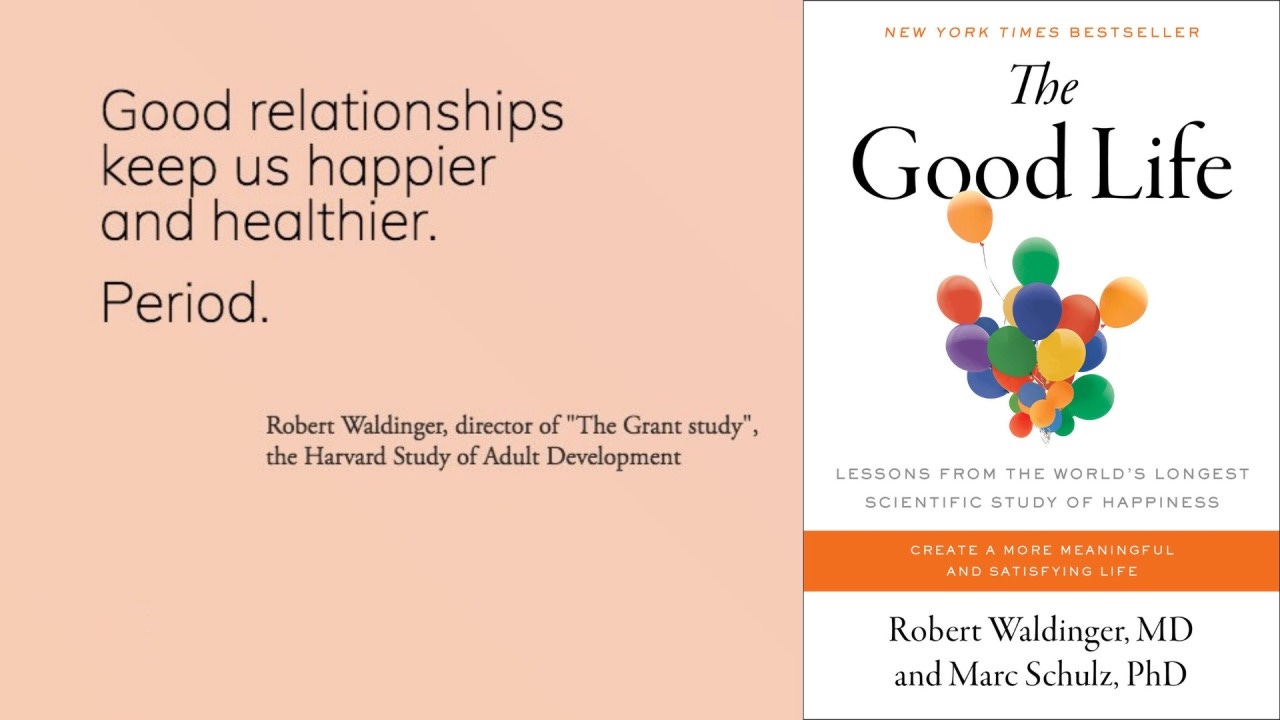Living The Good Life (In Business)
One of the most famous studies ever done is concluding. What does it teach us about how we can find more enjoyment in our businesses?
Let’s get something on the record: my degree in psychology isn’t just for show. I’m a psychology geek. I’ve loved the field ever since I first opened a psychology book in middle school. I knew going into high school that I would eventually major in psychology. When I tried to declare my psychology major my first week of college, even the dean was like, “Whoa, give it a few months. Maybe wait until your sophomore year1.”
I was never interested in clinical psychology, though. My favorite part of psychology was research – reading new studies, conducting studies, delving into why parts of human behavior are what they are, etc. Even after college, I’ve continued to read published scientific studies as I have time. Not only are they incredibly interesting (to me, at least), but I often find some intriguing tidbits that relate back to my own life, whether personal or business.
The study that has fascinated me more than any other is one of the most famous, longitudinal studies ever done: The Grant Study.
Before we go further, let me explain what a “longitudinal study” is for anyone that didn’t spend way too many hours in a classroom. Most psychological studies are “cross-sectional” studies. This is the typical study where you, for example, take a group of people, split them up into various conditions, test each one with different variables, and see how they differ. It’s a snapshot of one moment in time, and then everyone goes on their way. Every psychology student across the country at some point either takes part in one, or runs one (or both).
A longitudinal study is the opposite: you take a group of people, and you study only them over the course of a long period of time – often many years. Longitudinal studies are the most eye-opening ones, because in cross-sectional studies, you have to generalize the results from a group of people who you will never see again. In longitudinal studies, however, you can track changes to the same people over time. The results are much more accurate, more generalizable, and often more groundbreaking. The downside, of course, is that longitudinal studies are incredibly expensive to run. You need to be able to keep in contact with the exact same people on a regular basis. You’re liable to have attrition, either from people falling out of touch or people passing away. You can’t simply replace one participant with another. If a participant drops from the study, that slot (and the corresponding research that comes from it) is gone forever.
So what is The Grant Study? It’s a research project started in 1938 at Harvard Medical School by William Thomas Grant. He gathered 268 Harvard-educated men as volunteer participants, and followed them throughout their entire lives. He gave them questionnaires around every two years, took updated health information (including blood work) every five years, and flew to each one to interview them in person every five to ten years. The study was shortly thereafter joined by The Glueck Study, which did the same thing, but with 456 disadvantaged inner-city children in Boston. The goal of each study was simple: what factors make people the healthiest and happiest across their lives?
Even after Grant passed away, the study continued with a new director, and continues to this day as the Harvard Study of Adult Development – and children of the original participants have joined to help continue the research through a new generation.
As the years progressed, the results became much clearer, leading to current directors Robert Waldinger and Marc Schulz writing a book called The Good Life, which published in 2023 and which I highly recommend. The biggest finding was this: the greatest determining factor of someone’s health and happiness throughout their life is the quality of the social relationships they have with others.
Not money. Not power. Not the size of your house. Not your weight. Not your hobbies. Not how many walks you go on. But the relational support you have from others and which you give to others.
It wasn’t surprising to me that social support was a key factor. As The Atlantic wrote about the study, “You don’t have to examine scientific findings to recognize that relationships affect you physically. All you have to do is notice the invigoration you feel when you believe that someone has really understood you during a good conversation, or the tension and distress you feel after an argument, or how little sleep you get during a period of romantic strife.”
But it surprised me that it was the key factor. There wasn’t even a correlation with money, career, or anything else. Bar none, rich or poor, successful or not, your happiness was best predicted by your relationships.
Delving a bit deeper into their results, Waldinger and Schulz explain that “people who are more connected to family, to friends, and to community, are happier and physically healthier than people who are less well connected.” They found many cultural differences among people, systemic issues that affected various parts of their lives, and plenty of other factors that drew on differences between participants. “But the capacity of relationships to affect our well-being and health is universal,” they wrote.
As a self-identifying introvert, my initial feeling was one of burden. Ah man, does that mean I have to hang out with people more than I do now? What a bummer2.
But the more I thought about this, the more I realized how true this was, not just in our personal lives, but specifically in our business lives. Every business owner has good days and bad days, good weeks and bad weeks, sometimes good years and bad years. There are days we jump out of bed, excited to attack the day. There are days we pray that the alarm isn’t actually going off, and we can just stay in bed and let someone else handle the problems. But as I really get introspective about the causes of my good and bad days, I realize that it is 100 percent related to the relationships I have with others.
You can have great success financially – let’s say you just experienced the best quarter you’ve ever had. That’s fantastic! But the next day, are you really thinking about that? Are you skipping around the office bragging about how much money the company made? No, you’re onto the next thing. It’s just like I wrote about with employee happiness. People say they’re motivated by money, but two days after getting a nice bonus, they’ve already forgotten about it – but they haven’t forgotten about the asshole sitting next to them who keeps causing problems.
Indeed, as I pay more attention, I’ve noticed that the worst days I have are ones where I’m dealing with a personnel issue – a problem employee, or a difficult conversation I have to have with someone; or when a customer gets angry and lets loose at me; or when a supplier does something dishonest or unethical, or takes out their frustration on me and my company.
Likewise, some of the best days I have are when I’ve had a great conversation with someone: an employee who expressed how much they enjoy their job, and asks to do more; a supplier who strategized with me on how we can work together to help each other grow; a customer who shares the positives and negatives in a way that allows me to do better for them.
There are specific people within my industry that I absolutely love to talk to: they enlighten me, they challenge me intellectually, they laugh with me. I call them to check in if I think they’re having a rough time, and they do the same for me. There are people within my own company that make me feel this way as well. Business can be up, down, or anywhere in between, and I know those people will be there to support me.
There are also people who, when I see an email pop up from them, or someone tells me they’re on hold for me, I cringe. I know it’s going to be a bad day.
I find that, on the occasions I’m up at night, unable to sleep from some stress, it’s usually relationship-based, not results-based. If business is bad, that’s a problem we can solve in the office the next day. If there’s an issue that needs remedied, we can talk about it in the morning. My work life and my personal life remain separate, to the best of my abilities. But when I know I’m facing an awful conversation the next day, or if I’ve had an interaction with someone that has gotten me to the end of my rope, that is what sits with me uncomfortably like an airport shrimp cocktail.
How do you steer into this, though? The biggest problem I have, as I know everyone does, is that there is rarely enough time each day to focus on relationships, especially in business. There is too much paperwork, too many tasks, too many decisions that need to be made to allow you ten minutes to dial up someone you respect.
But think about the various moments you waste during each day. How many minutes a day do you brainlessly scroll through social media? Doom scroll on a news website? Stare at a blank screen willing your next task to completion? Add all of those together, and you’re probably missing valuable opportunities to garner even closer relationships with those you should.
Think of it this way: let’s say that there’s someone who brings you joy in business, but you only talk to them for five minutes once a month. Do the math – if you have ten years left in your current position, that means you will only speak to them for ten more hours the rest of your career. Is this person someone with whom you’d like more time? More than likely there are numerous of those in your business life.
“People’s lives don’t always play out the same, of course,” writes Jill Suttie in a review of The Grant Study. “Many circumstances make it easier or harder to preserve our well-being…Yet having positive social ties still makes a difference in survival rates, suggesting that relationships make us more resilient in the face of life’s hardships.”
Next time you have a few minutes, make a mental (or physical) list of people in business with whom you have a strong relationship. Make a few minutes each week to call one of them, briefly catch up, and strengthen that bond. It’s those kinds of interactions that will keep you moving when the going gets tough – as it inevitably will.
I waited until the first day of the second semester of my freshmen year. Don’t challenge me when I’ve set my mind to something.
I must be a blast to be around at parties, I know.



